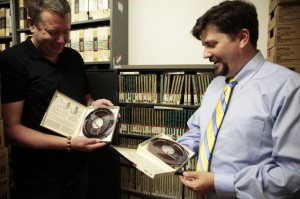The still-frame photos of the speakers from the 1960s and 1970s remain fixed on the screen, but in the background, their grainy yet commanding voices demand equality, demean politicians and prompt audiences of UCLA students to laugh and cry.
The speeches are part of a decaying collection of talks by politicians, entertainers and activists who came to UCLA and addressed topics such as civil rights. Until recently, the collection sat in two cabinets in Rolfe Hall with the UCLA Department of Communication Studies. Without the correct equipment available for UCLA community members to listen to the tapes, they remained dormant in history for more than four decades.
After a year of going through the tedious process of playing each tape through a reel-to-reel machine, converting it to MP3 then through iMovie on a laptop and uploading the content to the Department of Communications Studies’ YouTube channel, UCLA alumnus Derek Bolin is almost finished with preserving the collection of 400 deteriorating tapes. In the year off after his graduation, Bolin digitized more than 360 speeches, lectures and debates at his home during his spare time. Now, he is in the process of closed captioning the 10 most popular recordings.
Bolin, 44, has worked almost every day since August 2013 to digitize the speeches and debates, which were all given at UCLA during a time of political unrest and social activism. They include the voices of Jesse Jackson, John Wooden, Angela Davis and Joan Rivers.

Bolin took on the ongoing project because he wanted to preserve the recordings for future generations.
“In 100 years, people may still be listening to these speeches,” Bolin said. “Some of the tapes were in bad shape and deteriorating. Getting digitized means getting preserved in my eyes, because if we had waited a decade, it may have been too late.”
Tim Groeling, a communication studies professor at UCLA and the department’s chair, launched the project after realizing that the tapes had a limited lifetime and students did not have access to equipment needed to listen to them. For years, the tapes were improperly stored in a room with no air conditioning before being moved to faculty offices, he said.
After coming across reel-to-reel equipment for $20 at a Goodwill in Santa Clarita, Groeling said he thought the items could be used to help preserve the tapes in a format that the public could access. With about $13,500 from alumni donations to the department, Groeling was able to fund the project.
“I think it’s always interesting – when trying to understand an era – to hear the people of that era,” Groeling said. “(You can witness) social movements and activists in an unfiltered format. … It’s primary source material.”
While digitizing speeches, Bolin said he first made sure the audio was intact and didn’t aways pay close attention to the words of the historical figures that sounded through his home near Glendale. But after a while, he started listening to the speeches in a different way. He would play the tapes the whole way through just to hear from figures he recognized and those he never knew existed.
During some recordings, Bolin said he would laugh or stop his work in surprise or awe.
In one speech, Rod Serling predicts the future, guessing that someday people would have cassette tapes to bring home and watch on their own televisions, and that George Lucas could become a big-name director, Bolin said, laughing.
Other moments left him with goosebumps, like a 1960s speech by former Alabama governor and pro-segregationist George Wallace.
“He was introduced by (former UCLA Chancellor) Charles Young, who said, ‘I know his position on this issue is one with which most of you probably disagree, as I do myself. I do believe, however, that you will agree with me that it is important for all of us to be able to express our viewpoint and that you are going to give the governor that opportunity today,’” Bolin said.
The recordings reveal the attitudes of UCLA students during this time, since their reactions are also captured on tape. This is apparent during Wallace’s speech, Bolin said, where the students’ reactions stuck in his mind.
Wallace concludes his speech by thanking the audience for allowing him to speak, but a few students singing “We Shall Overcome” interrupt the applause, their voices swelling as more audience members join in until the recording fades out.
The release of the recordings on YouTube lets some UCLA community members like history graduate student Robert Schraff obtain further insight in their research.
Schraff discovered recordings of Sidney Cohen, a prominent doctor who argued that the drug LSD was only safe under medical supervision and could even be useful in certain situations. Schraff said he listened to Cohen’s speeches about LSD from 1965 and 1966 and is now writing his dissertation on the evolving attitudes toward LSD in Los Angeles.
“It gives me additional context and perspective,” Schraff said. “You can really see how (Cohen’s) views change between the two speeches.”
For Bolin, the most meaningful part of the project was preserving the words of who he thinks are lesser-known historical figures, such as the creator of the atomic bomb, Robert Oppenheimer.
“They are part of our history, and some of them are beginning to be forgotten,” Bolin said. “I was doing it for prosperity so that anyone who is interested in one of these speakers can listen.”
